|
|
|
Sort Order |
|
|
|
Items / Page
|
|
|
|
|
|
|
| Srl | Item |
| 1 |
ID:
162545
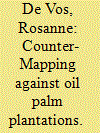

|
|
|
|
|
| Summary/Abstract |
This paper explores how villagers in Sambas District of West Kalimantan, Indonesia, attempt to protect their land rights against oil palm companies by engaging in mapping and spatial planning, in the context of the implementation of Indonesia's 2014 Village Law. Drawing on theoretical debates about counter-territorialization and counter-mapping, this paper considers how villagers use the Village Law to legitimate control over their territory. Although village-level spatial planning and mapping initiatives do not guarantee that land rights will be protected in the long term, spatial plans and maps can serve as leverage in negotiations with oil palm companies and government officials. Moreover, mapping and spatial planning help to organize people and boost discussions about land rights and different aspirations for land use. Proactive village-level spatial planning is necessary to find ways to maintain pre-existing ways of using land, and to counter notions of empty land, available for companies to claim.
|
|
|
|
|
|
|
|
|
|
|
|
|
|
|
|
| 2 |
ID:
162541
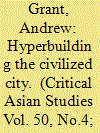

|
|
|
|
|
| Summary/Abstract |
Western China and the states of Central Asia are increasingly urbanized, and governments are investing large sums in founding and expanding cities. Rapid and spectacular hyperbuilding has led to the creation of unevenly developed urban districts and new tensions between unequally positioned residents. Xining City, the capital of China’s Qinghai Province in western China, has drawn large numbers of Tibetan migrants since the “Open up the West” Campaign accelerated urban development there in the 21st century. Tibetan migrants dwelling and working in Xining must find their place within the city as municipal authorities and developers continuously remake the urban landscape both materially and discursively. The current Chinese national project that promotes the “civilized city” is closely linked to this development; it is revaluing what counts as high-quality urban places and ideal urban behavior and contributing to the creation of new centers of monetary and cultural value as “civilization” is reimagined through spectacular new urban centers. Hyperbuilding is reshaping aspiring middle-class Tibetans’ understandings of their place in Xining relative to other ethnic groups. This paper argues that urban hyperbuilding produces not only new spaces for state and market power but also puts economic and social pressure on already marginalized ethnic minorities.
|
|
|
|
|
|
|
|
|
|
|
|
|
|
|
|
| 3 |
ID:
162543
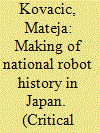

|
|
|
|
|
| Summary/Abstract |
This paper contributes a genealogical perspective to the social sciences study of robots in Japan, proposing a widely applicable research on “robot cultures.” The author discusses the corporate and governmental strategies and mechanisms that are shaping a national robot culture through establishing robot “lineages” and a national robot history which can have significant implications for both humans and robots. The paper contributes discussions on monozukuri (manufacturing) and Nihonjinron (theories on “Japaneseness”) to the existing anthropological consideration of robots, by examining links between monozukuri and robots, robot genealogy, popular culture and robots, and different social rituals and sites that help the enculturation of robots. The paper draws attention to the power relations and hegemonies of robot culture which also imply the existence of plurality and diversity that will require further scholarly attention as the robot phenomenon unfolds.
|
|
|
|
|
|
|
|
|
|
|
|
|
|
|
|
| 4 |
ID:
162542
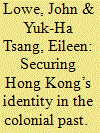

|
|
|
|
|
| Summary/Abstract |
The Umbrella Movement in Hong Kong is the most radical political movement to have taken place in the former British colony since 1967 anti-colonial demonstrations. Using empirical evidence obtained from activists who participated in the Umbrella Movement, this paper explains how Hong Kong’s youth are looking simultaneously to both the past and future to secure their identity in the colonial past even as some hope to achieve ultimate secession from Mainland rule. Racism and anti-Mainland hostilities in Hong Kong are the result of nostalgia and the insurrectionary impulse akin to the millenarianism of social movements founded on suffering and loss that continually seek the recovery of pasts of which they are now deprived. We illuminate how, to young activists, the Umbrella Movement presents hope for a future embedded in the past that remains one the territory and former colony may still aspire toward.
|
|
|
|
|
|
|
|
|
|
|
|
|
|
|
|
| 5 |
ID:
162544


|
|
|
|
|
| Summary/Abstract |
This article examines the ways in which North Koreans experienced and documented the American bombing campaign during the 1950–1953 Korean War. This bombing killed more than twenty percent of the North Korean population, but the everyday perspective of North Koreans of this traumatic event has not been widely studied. Drawing on official records, personal correspondence, newspaper reports, propaganda, North Korean documents, and literary journals, this article reconstructs the reality of the bombing as seen from ground zero. It examines North Korean responses – ranging from grief to anger – to the bombing and the ways it shaped their collective identity and reinforced their determination to fight.
|
|
|
|
|
|
|
|
|
|
|
|
|
|
|
|
| 6 |
ID:
162539
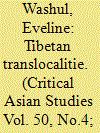

|
|
|
|
|
| Summary/Abstract |
Urban development in Tibetan areas of China lags behind that of other non-coastal, rural areas and occurs at a significantly smaller scale due to remote and mountainous terrain and a lower population density. However, just as in the rest of China, urban development in Tibetan regions is characterized by an unevenness that constitutes and produces new translocal ties, as people belong to multiple localities at the same time. But Tibetan patterns of translocal ties are unique. For college-educated Tibetans, structural factors such as educational institutions and ethnic discrimination and affective factors such as attachment to home places powerfully shape the landscape of urban opportunities along ethnic lines. Instead of educational and employment structures enabling Tibetans to pursue economic opportunities in urban centers across the country, socio-ethnic inequalities and thick relational ties eventually bring many Tibetan graduates back to the urban centers administratively connected to their rural home places in Tibetan areas.
|
|
|
|
|
|
|
|
|
|
|
|
|
|
|
|
| 7 |
ID:
162540


|
|
|
|
|
| Summary/Abstract |
This paper analyzes the transmission of China’s Ecological Migration Policy from the central government down to Tibetan villages and townships for implementation. It examines the specific ways through which the policy is translated from Chinese to Tibetan and communicated through various local dialects to concerned pastoralists. In order to achieve the Ecological Migration Policy’s purported objectives of environmental conservation, livelihood improvement, and urbanization, township government officials at the grassroots level mistranslate and miscommunicate policy meanings to villagers to render an otherwise unfeasible, impractical policy implementable on the ground. Tibetan pastoralists actively engage with this resettlement project to fulfill their desires and aspirations for accessing healthcare and educational services in urban areas. However, this pursuit of legibility is induced by the state’s negligence of rural pastoralist life and elimination of alternative educational facilities in rural communities. Both negligence and elimination of educational facilities in rural areas concentrate and increase investments in education and healthcare in urban settlements. These conjunctures ultimately drive Tibetan pastoralists to “choose” their only available option, to resettle in urban townships.
|
|
|
|
|
|
|
|
|
|
|
|
|
|
|
|
|
|
|
|
|